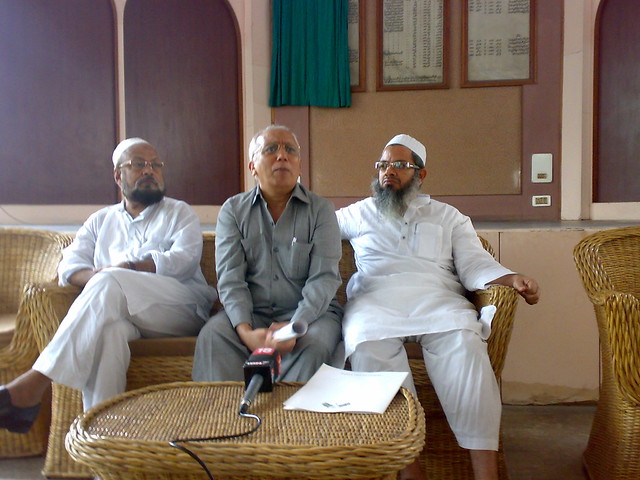By Md. Ali, TwoCircles.net
New Delhi: “The Right to Education Act is a welcome step because it will revolutionize education system in India, but some aspects of this Act clash with the Article 30 of the Constitution of India, and this needs to be amicably resolved through amendments.” said Mahmood Madani, leader Jamiat Ulama-e-Hind while addressing media persons in Delhi.

L to R: Niaz Ahmad Farooqui, Kamal Faruqui and mahmood Madani, addressing the media.
Article 30 of the Constitution of India allows minorities “the right to establish and administer educational institutions of their choice.” It was largely due to Article 30 that till now, madarsas have been fairly independent from the government. They didn’t have to, necessarily, take recognition from the government.
RTE Act defines “school” — whether government, aided or private — as any “recognised school” imparting elementary education. All the problems arise from the fact that this definition does not include madrasas. Now the question arise that how the government is planning to deal with madarsa after the enactment of RTE.
Unfortunately neither the RTE Act nor the HRD minister has been very clear on this,leaving the scope for speculation, fear and opposition among the minorities towards this path breaking Act.
Interestingly RTE Act also doesn’t have any thing to say on what will be the fate of bodies like National Commission for Minorities Educational Institutions, which make policy for minority education in India.
Although Mr. Salman Khursheed, minister for minority affairs, has dismissed apprehensions of Muslim organizations about future of madarsas after implementation of the act from April 30, 2010 but he hasn’t gone into much detail as to what are the safeguards that madarsas have against the above mentioned stringent provisions of the Act.
Talking to twoCircles.net, Mr. Madani pointed out that “we are concerned here about not only madarsas but also about thousands of private small schools, which impart education to millions of children in India. They impart education to a class of society, which doesn’t have access to the expensive education of big private schools. RTE Act, in its present form will ensure their closure and thereby deprive millions of children from education.”
Another problematic aspect is that Section 18 of the RTE Act makes “a certificate of recognition” mandatory for all schools. And Section 19 prescribes stringent conditions — such as building and classroom specifications, teacher-student ratio, study hours, library and playground facilities — for obtaining recognition.
Mr. Madani pointed out that “ironically if these stringent conditions for obtaining recognition were to be implemented, government schools will be the first ones which will be derecognized. The fact of the matter is that the kind of country India is, it is almost impossible for small schools to meet condition of teacher-student ratio, study hours, library and playground facilities as envisaged in the Act.”
In order to sort out these “negative aspects” of the RTE Act, Maulana Mahmood Madani, M.P leader Jamiat Ulama-i- Hind and Mr, Kamal Faruqui, former chairman, Delhi minorities commission, have convened a common representative conference on August, 5 2010.
It will have representation from major national level Muslim organizations, institutions educationists and legal experts, including 250 leading Ulama.
Mr. Kamal Faruqui told media persons that, K. Rahman Khan, Deputy Chairman Rajya Sabha, Mr. Kapil Sibal, Union Minister of HRD, Mr. Salman Khurshid, Minister of Minority Affairs, Mr. Virappa Moily, Union Minister of Law & Justice and Mr. Ghulam Nabi Azam, Union Minister of Health & Family Welfare, apart from all Muslim members of the parliament and important official and representative from cross community, are expected to attend this conference.
Mr. Faruqui pointed out that after the conference, a national level working group would be constituted which will, after discussion and debate on August, 6 2010, come out with a road map on how to deal with the negative aspects of the RTE Act. That working group will set the agenda for practical strategy and memorandum of demands to the government.
